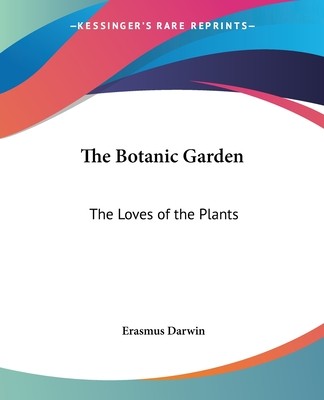
- We will send in 10–14 business days.
- Author: Erasmus Darwin
- Publisher: Kessinger Publishing
- ISBN-10: 1419154907
- ISBN-13: 9781419154904
- Format: 19.2 x 23.4 x 1 cm, minkšti viršeliai
- Language: English
- SAVE -10% with code: EXTRA
Reviews
Description
Published in the series (Revolution and Romanticism 1789-1834) chosen by Jonathan Wordsworth. Written by the grandfather of Charles Darwin, who personified and humanized the sexual life of plants, for which he was parodied and reviled.
Epic poetic tribute to the lives, loves, and reproductive capacity of plants by the grandfather of Charles Darwin. Darwin's Botanic Garden is important for the five plates in part I which are engraved by William Blake: 'The Fertilization of Egypt,' engraved after the painting by Henry Fuseli, and four engravings of the Portland Vase. "The chief source of Erasmus Darwin's literary fame during his lifetime, The Botanic Garden contains a great deal of important and frequently advanced scientific information in the nearly 300 footnotes and the 115 pages of appendices to its verses." -The Encyclopedia Britannica
A titillating portrayal of the lives and loves of plants in vividly sexual terms in a poem titled The Loves of the Plants. A vegetable passion, he argued, was visible in a wide variety of erotic behaviors in plants, from the chaste intercourse of a romantic plant pair, to female plant parts entertaining multiple male suitors, to even wilder orgiastic fare. The personal lives of his plants charmed contemporary sensibility, which appreciated “something a little naughty,” and his poem benefitted enormously from the fact that botanical study was all the rage among the genteel classes at the time.
EXTRA 10 % discount with code: EXTRA
The promotion ends in 23d.04:11:23
The discount code is valid when purchasing from 10 €. Discounts do not stack.
- Author: Erasmus Darwin
- Publisher: Kessinger Publishing
- ISBN-10: 1419154907
- ISBN-13: 9781419154904
- Format: 19.2 x 23.4 x 1 cm, minkšti viršeliai
- Language: English English
Published in the series (Revolution and Romanticism 1789-1834) chosen by Jonathan Wordsworth. Written by the grandfather of Charles Darwin, who personified and humanized the sexual life of plants, for which he was parodied and reviled.
Epic poetic tribute to the lives, loves, and reproductive capacity of plants by the grandfather of Charles Darwin. Darwin's Botanic Garden is important for the five plates in part I which are engraved by William Blake: 'The Fertilization of Egypt,' engraved after the painting by Henry Fuseli, and four engravings of the Portland Vase. "The chief source of Erasmus Darwin's literary fame during his lifetime, The Botanic Garden contains a great deal of important and frequently advanced scientific information in the nearly 300 footnotes and the 115 pages of appendices to its verses." -The Encyclopedia Britannica
A titillating portrayal of the lives and loves of plants in vividly sexual terms in a poem titled The Loves of the Plants. A vegetable passion, he argued, was visible in a wide variety of erotic behaviors in plants, from the chaste intercourse of a romantic plant pair, to female plant parts entertaining multiple male suitors, to even wilder orgiastic fare. The personal lives of his plants charmed contemporary sensibility, which appreciated “something a little naughty,” and his poem benefitted enormously from the fact that botanical study was all the rage among the genteel classes at the time.


Reviews